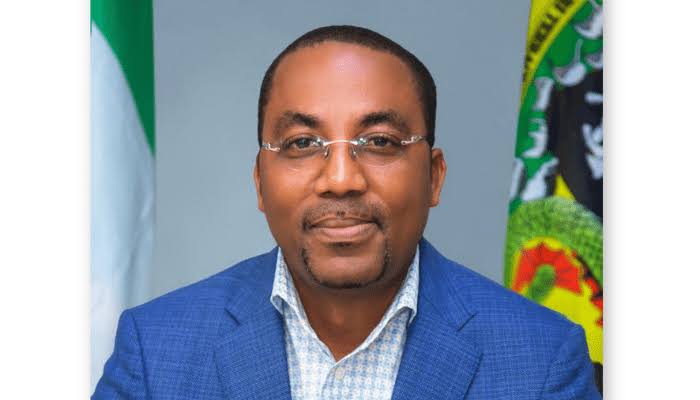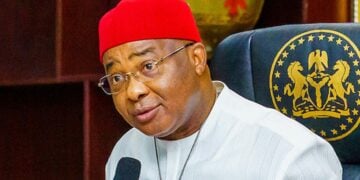Availability of seaports is one of the critical element for ranking on Ease Of Doing Business (EODB) Index around the world. Efficient cargo clearance, quick turn around time of vessel as well as cargo dwell time are prerequisites for the ranking.
However, federal government identified encumbrances to acheiving ease of doing business at the port to include cumbersome clearing process, numerous agencies of government involved in clearance process among others as Nigeria go down the ladder in the World Bank ranking of countries in ease of doing business.
To ensure efficiency of the seaports, vice president, Prof. Yemi Osinbajo, signed an executive order in 2017 pruning down the numbers of agencies at the nation’s seaports from 11 to seven.
Seaports is one of the index of measurement of the East of Doing Business (EODB) report around the world and in a world where 80 per cent of trade are sea borne, ports when well managed are enablers of national development.
To improve Nigeria ranking on the EODB, vice president, Yemi Osinbajo, launched the second National Action Plan on Ease of Doing Business as part of the administration’s medium term Economic Growth and Recovery Plan (EGRP) to build a globally competitive economy.
And, to implement the National Action Plan on EODB, the FG reformed the ports and that led to the sack of several agencies of government that were hiterto sacked by the administration of Dr Goodluck Jonathan, to once again vacate the seaports.
The agencies sacked were, Standard Organisation of Nigeria (SON); Port Quarantine Services; National Agency for Food and Drug Administration and Control (NAFDAC), and Nigeria Agricultural Quarantine Service (NAQS),National Environmental Standards and Regulations Enforcement Agency (NESREA) and the Federal Environmental Protection Agency (FEPA) among others.
However, of all the agencies sacked from the seaports, SON, has been lobbying stakeholders, lawmakers and even the executive on the need to return to the port saying, the country should be saved from importation of substandard products.
According to the director general of the agency, Mallam Farouq Salim, lamented that Customs is only doing random checking of 10 out of 100 containers coming to the seaports and border stations which has resulted in the high influx of substandard products into the country.
But, the DG’s call have been rebuffed by stakeholders who disclosed that SON’s returning to the seaports will drag Nigeria down the ladder of EODB.
Stakeholders who refused the return of SON to seaport argued that rather than seek return to the seaports, the agency should strike a balance between core quality standard, regulatory obligations and revenue collection.
A former president, National Association of Government Approved Freight Forwarders (NAGAFF), Dr Eugene Nweke, who said SON’s absence in the seaports has nothing to do about influx of substandard products into the country through the seaports, but revenue generation, which he said no one rival Nigeria Customs Service on.
Nweke, urged Nigerians to inquire why substandard goods are only dumped in Nigeria’s shores and not neighboring countries’ ports.
He said, “My emphasis being that, the SON non participation in physical examination or as christened, non presence in the port has little or nothing with the influx of the substandard goods into the ports. The SON should be bold to confront their fears for the sake of the nation, and stop playing to the gallery.”
“When a standard regulatory agency tilts or fails to strike a balance between its core quality standard regulatory obligations and revenue obligations, one will be achieved greater at the detriment of the other obligations. Most of the regulatory agencies should stop emulating the Customs, Customs core obligations is revenue generation and to curb activities that limits it from achieving bumper revenue generation, hence, anti smuggling operations.”
Nweke, explained that reasons why sub-standard cargoes were not shipped to neighboring countries were because shipping companies are penalised for bringing in substandard cargoes.
He stated further that Nigeria must have a national shipping policy that must be obeyed by foreign shipping lines operating and wishing to do business in the country.
“Ever wondered how come the shipping lines deliver only standards trade goods to other neighboring west Africa countries ports? You think it is because of the compliance nature of the trading public? Certainly not,” he answered.
“Their countries trade & shipping policies are explicit. Goods coming into their country ports must meet the national quality specifications, failing to do so, the shipping lines will be penalized, and in most instances, the shipping lines are made to ship back the goods to the origin port at its expenses.”
“It is a national shipping law and it qmust be obeyed by any shipping lines wishing to do business with their country. Have you also noticed that goods which final destinations is Nigeria but trans-shiped to any of the west Africa countries are adequately monitored at stripping operations, just to ensure that, not even a product carelessly enters the street , talk less of the market overt.”
“NESREA at inception achieved such feats. Our product quality standards must remains our national standard, no compromise to it, as evidence both in policy application and in practice. The SON knew too well that, it’s greatest challenge stems from its lack of regulatory control over the shipping lines.
“You may appreciate the ongoing, high degree of extortion in the shipping industry, however, shipping industry is not the import of this modest reaction. One will have expected that, the SON other than accusing the Customs NICIS 2 as the cause of its non achieving desired quality regulatory objectives, should partner with the Customs and fashion out a Container Security Initiative – CSI as obtain in other importing climes.”
“America, Britain, South Africa, and many other countries do import from China, as well, but signed up into a CSI known as the Advance Manifest Rule (AMR) o Automated Manifest System ( AMS) with the China/Shipping line. Six rules are involved, one of such rules state that, carriers will have to transmit cargo declaration to the nation’s Customs Authority at least 24 hour prior to commencement of loading operations at the port of loading.
“After documentary check by Customs and other regulatory agencies, the Customs will notify the carrier of those shipment that are permitted to enter the nations respective port of discharge. This is my strong position on this important issues of the influx of substandard products into our country. We must resolve to do something entirely different,” he warned.
On his own, the managing director, Widescope International Logistics Limited, Dr. Segun Musa, bemoaned clearing agents calling for return of SON to seaports, saying they may have been compromised.
Musa argued that SON and some other agencies were sacked from the seaports in 2011 for frustrating cargo clearance procedure.
He said in the 21st century, cargo clearance are digitalised and automated worldwide, but wondered why people will decide to drag the industry backward over personal interest.
He said, “We live in the 21 century where cargo clearance activities globally are being automated and clearance processing are now being digitalised. Why will some groups could be so myopic to drag us backward due to personal interests.
It is obvious that not everyone that claimed to be stakeholders are truly stakeholder but some are only interested in satisfying their pockets. I was surprised to read that some stakeholders gathered to endorse the return of SON to the ports and it is obvious that those involved are most likely to have either collected bribe to compromise or are new in the industry.
“For every critical stakeholder in the maritime industry that has been around for over 10 years now, such person would easily remember why we agitated for the removal of SON, NAFDAC and other multiple agencies whose roles in the ports is to frustrates cargo clearance and trade facilitation.
“I am highly disappointed in all the self acclaimed stakeholders that endorsed this backwardness for our industry and assured that such proposal shall never see the light of the day. The world is advancing and its better to join, otherwise, the world would advance without Nigeria and the only methological approach is to embrace technological solutions to automate our systems.”
He, however, wondered whether those calling for the return of SON are genuine stakeholders working for the progress and success of the maritime sector.”
“We live in a global neighbourhood where every country has advanced and keep advancing it’s modus operandi in cargo clearance and ports operations to reduce physical contacts and encourage systems connectivity to ease port processes.”
“We are working tirelessly to remove the few agencies in the ports and encouraging them to hook up to technology and systems audit available on the Customs platform that pushes all commodities to respective regulatory agencies and profiles any import not duly released to identify how it was exited.”
“How could any genuine stakeholder propose or prefer a step back to analogue instead of digital for our port Industry?”





